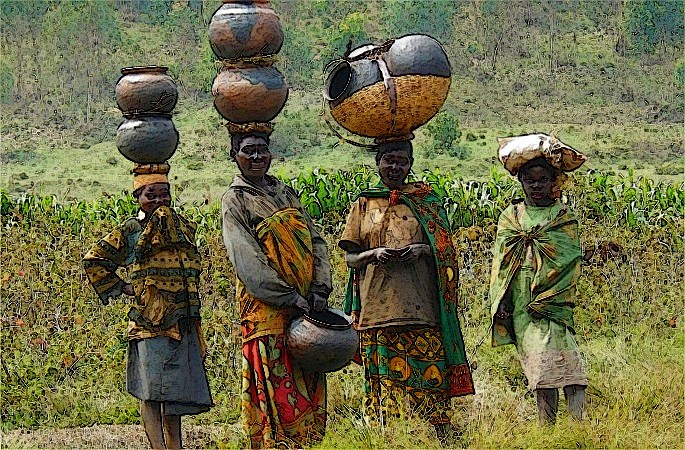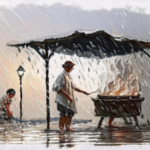Rural women across Africa continue to suffer from various constraints that inhibit them from producing food including lack of credit, lack of training, lack of updated information as well as overwork. Rural women also get exposed to agrochemicals, most of which they use without protective gear. For agriculture to thrive it needs monetary investment. Many women cannot effectively produce food because of a lack of finances. They also lack collateral and hence cannot take loans for farming. Being farmers and depending on rain-fed agriculture is also an everyday risk faced by women. When crops die because of prolonged drought as is the current situation in countries such as Kenya and the Horn of Africa region, women are the ones expected to provide food in the household.
Women tend to overwork, they undertake both productive and reproductive roles within the household. A conversation with community members on how much work is done by men and women in a day will result in the finding that women’s work tends to be more but is hardly recognized or economically quantified. In a rural household, it is women who cook, prepare the land, take children to school, milk the cattle and prepare food. Rural women often sleep last and are always the ones to wake up the earliest. Rural women also lack agricultural extension services, and this makes them vulnerable to wrong narratives. For example, agrochemical companies easily dupe women to continue using synthetic chemicals on their farms without telling them the likely negative impacts of these additives on soil health, water and food.
When it comes to decision-making, be it in the household, in the local community or in budgetary allocation processes n agriculture within a devolved system of government such as the case of Kenya, women’s voices are muted. Public meetings locally known as baraza never favour women; whenever these meetings are held, women are always busy at home and hence unable to attend. Within the household, rural women and by extension urban-based women are often relegated to the kitchen. On land rights, the main factor of production, women’s presence is deliberately excluded. The land is often in the name of male relatives, and women have to seek permission to use land and plant food. If widowed, rural women get evicted from their land, losing the ability to produce food; their next option becomes informal settlements in the city. And sometimes the land they are deprived of is sold to the next willing buyer.
Rural women in Africa today are facing the twin challenges of climate and food crises. As providers of food, women have to travel long distances in search of water. With climate change, rural women are subjected to more labour as they spend more time looking for scarce resources. Climate change also exacerbates household gender-based violence for women. For example, when women have to queue for long because there is less water, when they come home they have to explain why they are late, and this could result in beatings and other forms of violence. omen from the Maasai community in the Mara shared that when a woman comes home after 6 pm, she gets beaten whereas when a man comes back home late, no questions are asked. When queried whether they find this wrong, the response was that this is part of our culture and we have accepted it.
The recent increase in climate shocks, extreme weather events and climate‐related disasters further worsen the status of women. Further still, as the main caregivers and providers of food, water and fuel, women’s restricted access to and control over key natural and productive resources undermine their rights and economic capacity, affecting the efficiency of the agricultural sector and limiting economic growth overall, failing to tap into women’s enormous productive potential.
There is an intersectionality between food and other injustices not only in Africa but across the world. Lack of food pushes parents to marry off their children in the hope that they will get a better life. UNICEF notes that in regions such as Ethiopia, child marriage is on the rise due to drought. No mother wants to see her child hungry; however, this is the reality across the Horn of Africa where families don’t have any remaining options as they battle to survive drought, water scarcity and skyrocketing food prices. Famine Early Warning Network goes further to note that 1.8 million children are in need of treatment due to life-threatening severe cases of acute malnutrition.
Rural women will continue to suffer so long as they are excluded from controlling land. The main belief is that women cannot be trusted to handle the property. Furthermore, conversations with men during communal land dialogues organised by Kenyan Peasant League confirm that eviction from matrimonial homes and the inherent denial of property rights continue to impoverish women not only in rural areas but also in urban areas where they seek refuge in informal settlements after losing their land to relatives in their villages. Many constitutions all over Africa speak of equality, but when it comes to matters of property, this equality is never realised. Cultural practices give more power to males, forcing women to accept a life in poverty. There is also the assumption that women will get married and get land in the husband’s family. But this is not always the case as women are often treated as foreigners in both their father’s homes and their matrimonial homes. During land-related community dialogues, women also reveal that although married for many years and even having grown-up children, the majority have never seen the title deed to the land on which they farm. This puts women and their children in a very precarious position in terms of potential disinheritance, especially in cases where women are not empowered to exercise their rights or where husbands die intestate.
The lack of farm inputs essential in food production such as seeds is also a problem; the dominant narrative that indigenous seeds are archaic and non-productive has greatly contributed to this. In Africa, women are the nurturers of seeds; they ensure the continuity of life. This age-old activity undertaken by African women is being threatened by disappearing seed varieties. It is impossible to produce food when you don’t have seeds. To continue the cultural relevance of food in Africa, to ensure loyalty to the taste of food as we know it in Africa, indigenous seeds need to be available in every rural household. This ensures biodiversity and nutritional sufficiency. Another reality in rural areas which has a direct impact on household food insecurity is the disappearance of granaries. With the so-called shift to modernity, granaries are becoming a thing of the past. However, there is a direct relationship between the existence of a granary and the availability of food in a household. With the erosion and disappearance of granaries, agro vets are becoming seeds stores for farmers. There is a need for campaigns in villages far and wide in the African continent to bring back granaries and indigenous seeds. In this way, families will be assured of nutritional value and diversity in what they eat.
Access to credit should be available to rural women to enable them to produce food undisrupted. This calls for solidarity funding and solidarity marketing where consumers and producers are more connected; producers are assured of markets for their products and consumers know where their food comes from. The onset of COVID-19 confirmed to us that the best markets are those found within your borders. The hard questions on the International Rural Women’s Day and by extension World Food Day is what have African governments learnt with regard to food production from COVID-19, what lessons are they taking forward or will it be business as usual? It is quite sad to imagine that many years ago, most African countries could produce their own food but have now become net importers of food, with the 1980s being the turning point.
To address the multiple forms of oppression that rural women encounter on a daily basis, it is important to create platforms for rural women to make decisions, to be able to question existing food chains and to have meaningful participation in budgetary processes specifically on food and related expenditures. Food is political because it involves decision-making about who gets what and when; it involves people’s lives and livelihoods, for the current and future generations. The absence of women in policy spaces relating to food is an apparent contradiction because women are the majority of food producers and agricultural workers as well as household nutritionists; they have the responsibility of ensuring balanced diets and at the same time availability of sustainable sources of food.
It is also important to deliberately create consciousness among women to challenge patriarchal norms that inhibit control of land and other factors of production. In Africa, rural areas are the reservoirs of food. Close off any African rural community and cities will die of hunger. In order to address rural women’s poverty and stay true to the 2022 theme of International Rural Women’s Day, it is important to ensure rural women have the requisite support in terms of skills, knowledge, access to credit as well as storage facilities. Rural women also need skills in marketing, storage equipment and skills in increasing the shelf life of farm produce. There is also a need to harness efforts towards addressing the care work imbalance in households, which leaves women with the double burden of care roles and productive work on the farm. Unpaid care work should be an everyday conversation. There is a need for the valuation of women’s contribution to the household and redistribution of household chores and incomes. This can only be realised by organising conscious raising sessions that bring both men and women together for reflection and continuous advocacy targeting men.
For 2022, however, we cannot say we are celebrating International Rural Women’s Day when these same women continue to suffer from hunger and the adverse effects of the climate crisis. Hopefully, we learn from these crises and emerge stronger, in the years to come.



